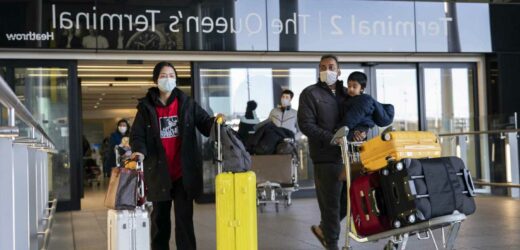TRAVEL rules are decreasing for Brits returning to the UK from tomorrow.
But there are still restrictions in place for arrivals in other countries, as governments around the world continue to fight against the spread of Omicron.

From 4am tomorrow, holidaymakers will no longer need to take pre-departure Covid tests before they return to the UK.
And from 4am on Sunday, Brits will no longer be forced to pay for expensive PCR tests when they get back.
But entry requirements for popular holiday destinations are changing rapidly, so Brits with holidays plans need to keep up-to-date with the rules they must follow.
The rules vary from country to country so check the entry requirements for your chosen destination regularly.
We've rounded up the entry requirements and rules for Brit-favourite holiday spots.
Cyprus
The UK is on Cyprus' red list as the country tries to curb the spread of Covid.
All travellers aged 12 and above arriving into Cyprus must complete an online form and have a negative PCR test result taken within the 48 hours before departure.
Travellers must then take a second PCR test as soon as they land at the airport in Cyprus, at a cost of between €15 and €19.
Brits must self-isolate in their accommodation until they receive their test result – which should be within three hours.
If the result is positive, they must remain in isolation and await instructions from the Ministry of Health.
If the result of the airport PCR test is negative, Brits must complete daily self-tests for five days.
If any of those test results are positive, they must contact the Ministry of Health.
After they have been in Cyprus for 72 hours, and provided they have negative self-test results from the previous days, they must have a rapid test at a mobile unit of the Ministry of Health. This is free for those presenting a boarding pass at the testing site.
Children under the age of 12 are exempt from testing.
Germany
Germany has recently reopened to Brits, after it imposed strict rules before Christmas.
Vaccinated Brits can now enter the country by showing proof of vaccination.
Unvaccinated Brits may only enter Germany if they are a German citizen or resident, if they are married to a German citizen or resident, or if they have an urgent need to travel.
For Brits eligible to enter Germany who are not fully vaccinated, must provide evidence of a negative Covid test result.
They must then spend 10 days in quarantine, with the option of testing to release after five days.
France
France has confirmed that it will loosen travel restrictions for Brits.
However, it is not yet known when restrictions will be lifted.
Currently, only Brits travelling for essential reasons can visit France, regardless of whether they are vaccinated.
Travellers with an essential reason, for example, to see a dying relative, must present a negative PCR or antigen test result taken within 24 hours of departing.
Upon arrival, you must isolate for 48 hours, after which you must should a negative PCR or antigen test to exit isolation.
Without a negative test, you must isolate for 10 days.
Arrivals will need to give contact details to the French authorities and complete a sworn statement confirming they're not suffering from Covid symptoms.
Everyone must wear face masks indoors and on public transport.
Netherlands
The Dutch authorities classify the UK as a 'very high risk area'.
Fully vaccinated Brits must provide proof of vaccination and a negative Covid test.
All travellers from the UK, irrespective of their vaccination status or possession of a negative test, must quarantine for 10 days.
This can be reduced if the person receives a negative test result from the Dutch authorities on day five.
UK nationals who are legally resident in the Netherlands can re-enter the country regardless of their vaccination status, but will need to show a residency permit or a certificate of application.
Spain
Only vaccinated Brits can enter Spain and they do not need to test or quarantine.
To enter, you must show proof of being fully vaccinated, and your second jab must have been at least two weeks before you travel.
Passengers must fill out an online form and may be subject to a temperature check, visual health assessment, or testing on arrival.
Children under the age of 12 do not need to show proof of being fully vaccinated to enter Spain.
Most read in News Travel
JAB AND GO The countries you need a Covid booster jab to enter
Greece & Turkey snow travel warning as flights cancelled and roads blocked
Family holiday warning – kids who had Covid without PCR test face travel ban
Balearic and Canary Islands tighten Covid rules – with clubs at 25% capacity
Portugal
Brits can only enter Portugal for essential purposes, such as to live with immediate family members, or for professional, educational or health reasons.
Before arriving, Brits must fill in an online passenger locator form.
To get on the plane, Brits aged 12 and over must have taken an antigen test within 48 hours of departure, or a PCR test within 72 hours of departure.
Upon arrival, you'll be subject to health screening.
If your temperature is 38C or over or you show signs of being unwell, you may have to take a Covid test and wait at the airport until you get the result.
Italy
Vaccinated Brits can enter Italy without needing to self-isolate.
They must fill in a passenger locator form before arrival and show proof of a negative PCR or antigen test taken within 48 hours before entering Italy.
Unvaccinated Brits must do the same, but in addition, must notify the Italian authorities of their entry into the country.
They must then travel to their final destination in private transport, self-isolate for five days, and take another Covid test at the end of the isolation.
Children under 18 do not need to quarantine if they are travelling with a fully vaccinated parent and have a negative Covid test.
Regardless of your vaccination status, anyone arriving in Italy may be subject to random Covid testing on arrival until January 31.
Children under the age of six are exempt from testing.
Greece
All Brits aged six and above must fill in a passenger locator form before arrival in Greece, and must show proof of a negative PCR or antigen test.
Arrivals into Greece may be required to have a rapid Covid test. If you test positive, you and those you are travelling with will have to self-isolate in a quarantine hotel provided by the Greek state.
The length of time you need to isolate depends on your vaccination status.
US
Vaccinated travellers heading to the United States must show a negative antigen or PCR test taken within one day of departure.
Unvaccinated Brits cannot enter the US.
Face masks are mandatory on planes, trains, buses and at airports.
Turkey
All Brits arriving in Turkey aged six and over must complete an online form.
Those aged 12 and over must then prove that they are either fully vaccinated, recently recovered from Covid, or show a negative PCR or antigen test.
All arrivals will be subject to a medical evaluation for symptoms of Covid, including temperature checks.
Arrivals may also be subject to random PCR testing.
Airlines have been cancelling flights due to a lack of demand for air travel caused by the pandemic.
British Airways has cancelled more than 2,000 flights until March.
Ryanair has also cancelled flights, with more than 230,000 passengers facing disrupted travel plans.
Tour operator Saga has cancelled some holidays for 2022, affecting around 3,000 bookings.

Source: Read Full Article






